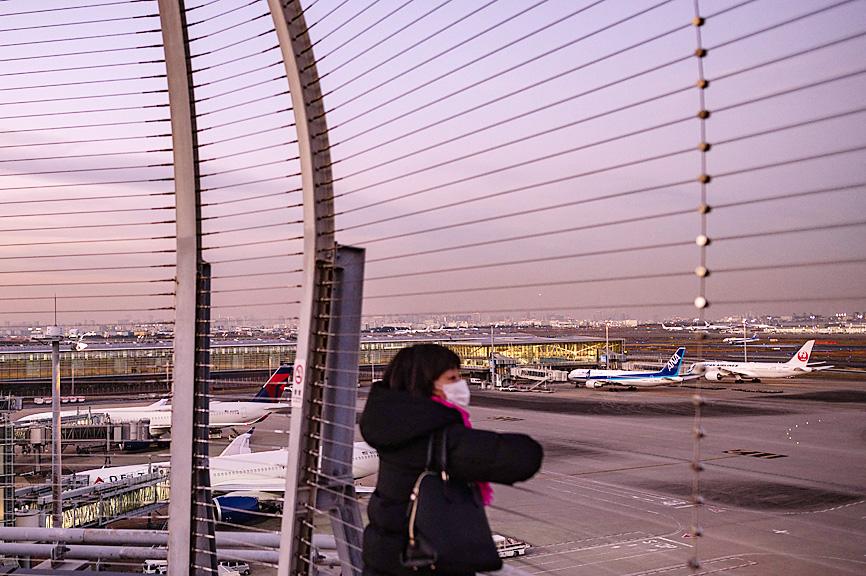Japan yesterday announced it would bar all new foreign travelers amid concern over the Omicron variant of SARS-CoV-2, joining a growing list of countries trying to erect virtual fortresses against the heavily mutated new strain.
The move came as the WHO warned that the new variant poses a “very high” risk globally, despite uncertainties about the danger and contagion levels of the strain.
The Japanese government has become the latest country to reinstate strict border controls that many had hoped would be a thing of the past, barring all new foreign arrivals just weeks after announcing it would finally allow some visa holders to enter the country.

Photo: AFP
Japanese Prime Minister Fumio Kishida said the country was “in a stronger position against the Omicron variant than other countries,” citing voluntary mask-wearing and self-restraint about risk behaviors.
The Philippines also said it would temporarily suspend plans to allow fully vaccinated tourists entry, in a bid to prevent the variant taking off in a country where most of the population remains unvaccinated.
Manila had hoped to revive the country’s battered economy by allowing jabbed tourists entry as of tomorrow. The variant is also throwing a tentative opening-up into doubt in Australia, where the government is reconsidering plans to relax border restrictions.
The WHO yesterday said the new strain first discovered in southern Africa was a “highly divergent variant with a high number of mutations ... some of which are concerning and may be associated with immune escape potential and higher transmissibility.”
“The likelihood of potential further spread of Omicron at the global level is high,” WHO cautioned in a technical note.
To date, no deaths connected with the Omicron variant have been reported, it added.
Even if the new variant does not prove more dangerous or deadlier than previous ones, if it spreads more easily, it would spark more cases and more pressure on health systems, and thus more deaths, the UN health agency said.

Auckland rang in 2026 with a downtown fireworks display launched from New Zealand’s tallest structure, Sky Tower, making it the first major city to greet the new year at a celebration dampened by rain, while crowds in Taipei braved the elements to watch Taipei 101’s display. South Pacific countries are the first to bid farewell to 2025. Clocks struck midnight in Auckland, with a population of 1.7 million, 18 hours before the famous ball was to drop in New York’s Times Square. The five-minute display involved 3,500 fireworks launched from the 240m Sky Tower. Smaller community events were canceled across New Zealand’s

The Ministry of Foreign Affairs (MOFA) yesterday said it is closely monitoring developments in Venezuela, and would continue to cooperate with democratic allies and work together for regional and global security, stability, and prosperity. The remarks came after the US on Saturday launched a series of airstrikes in Venezuela and kidnapped Venezuelan President Nicolas Maduro, who was later flown to New York along with his wife. The pair face US charges related to drug trafficking and alleged cooperation with gangs designated as terrorist organizations. Maduro has denied the allegations. The ministry said that it is closely monitoring the political and economic situation

‘SLICING METHOD’: In the event of a blockade, the China Coast Guard would intercept Taiwanese ships while its navy would seek to deter foreign intervention China’s military drills around Taiwan this week signaled potential strategies to cut the nation off from energy supplies and foreign military assistance, a US think tank report said. The Chinese People’s Liberation Army (PLA) conducted what it called “Justice Mission 2025” exercises from Monday to Tuesday in five maritime zones and airspace around Taiwan, calling them a warning to “Taiwanese independence” forces. In a report released on Wednesday, the Institute for the Study of War said the exercises effectively simulated blocking shipping routes to major port cities, including Kaohsiung, Keelung and Hualien. Taiwan would be highly vulnerable under such a blockade, because it

UNRELENTING: China attempted cyberattacks on Taiwan’s critical infrastructure 2.63 million times per day last year, up from 1.23 million in 2023, the NSB said China’s cyberarmy has long engaged in cyberattacks against Taiwan’s critical infrastructure, employing diverse and evolving tactics, the National Security Bureau (NSB) said yesterday, adding that cyberattacks on critical energy infrastructure last year increased 10-fold compared with the previous year. The NSB yesterday released a report titled Analysis on China’s Cyber Threats to Taiwan’s Critical Infrastructure in 2025, outlining the number of cyberattacks, major tactics and hacker groups. Taiwan’s national intelligence community identified a large number of cybersecurity incidents last year, the bureau said in a statement. China’s cyberarmy last year launched an average of 2.63 million intrusion attempts per day targeting Taiwan’s critical